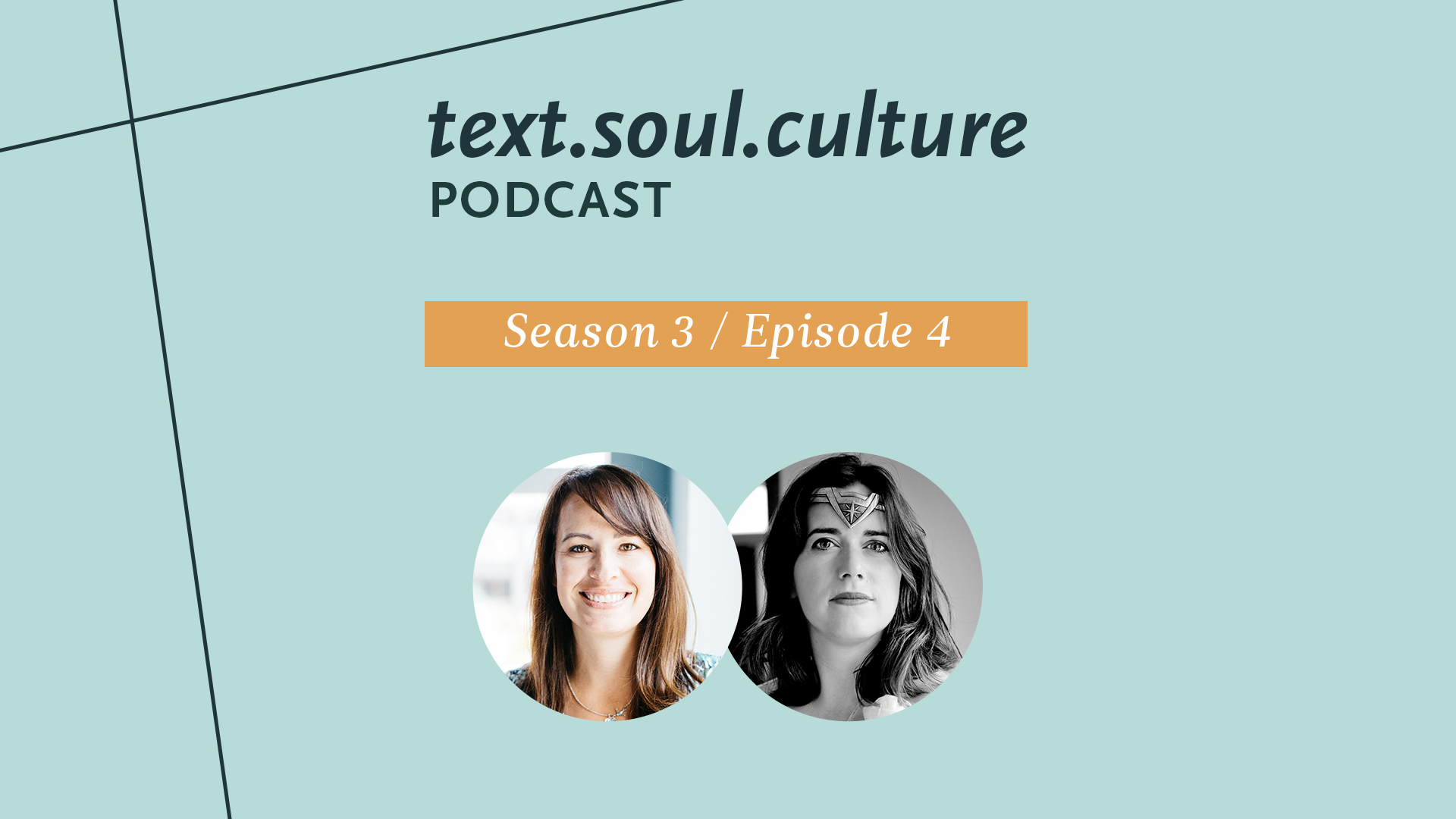On this episode of text.soul.culture, Shauna Gauthier, Alumni Outreach Coordinator, talks with Heather Abbott (MA in Counseling Psychology, ‘10) about her journey with stage 4 cancer and the relentless, hope-filled joy that she found even in the midst of great suffering.
When Heather received her cancer diagnosis, she knew this was not a road that she could walk alone. So, somewhat on a whim, she got a Wonder Woman costume to match her daughter’s Halloween costume, and she wore it to her first day of chemotherapy. A friend, Bridget Beth Collins (@flora.forager on Instagram), created a plant-based portrait of Wonder Woman for Heather, and #chemowonderwoman was born.
Soon, Heather’s friends and family were spreading the word and wearing Wonder Woman shirts in support, along with teachers from her kids’ school and strangers from around the country—Heather shares in particular about a grandmother in Ohio who prays for Heather every day even though they have never met. Even Gal Gadot, star of the hit Wonder Woman film, expressed her support for Heather.
“I just felt really carried, I felt really held by hundreds of people I’ve never met.”
Heather tells Shauna that while she was grateful her journey could inspire and encourage so many people, she also launched @ChemoWonderWoman out of her own need for support. “I need people alongside of me, to cheer for me, to be with me in this,” she says. “I can’t do this alone. I can’t do this even with just my small family tribe. I really need to, in some ways, open myself up to receive more help. I need connection and care.” In that spirit, her friends told her, “You’ve got this. We’ve got you.” It’s a truth that flies in the face of our cultural “pull yourself up by your bootstraps” mentality: We need each other.
Shauna: “You allowed us all to experience something of your beauty in the midst of this seemingly daunting race—the way that you’re able to go after the experience of suffering with such play is profound to me.”
Shauna shares that she can feel joy in her body, almost to an unfamiliar degree, when she’s with Heather, when she witnesses Heather’s “come with me” posture that is vulnerable, courageous, and infectious. Heather reflects on the intentional choice to hold onto her hope in beauty and goodness, even in the midst of darkness—not in denial of the darkness, but in defiance of it. She shares how that posture is informed by the world around her, including the beautifully stubborn life in her garden, and by her eschatological hope in a new heaven and new earth.
Heather: “Our body wants to heal. I really, really believe that, even more strongly after all this treatment than I did before. I talk about that as a gardener too: the plants are on your side, they want to live.”
Shauna: “I feel like the hope isn’t just optimism. It’s rooted in your theological framework, but it’s also rooted in your trust of creation—the plants want to grow, your body wants to heal. There’s this sort of rooted hope and trust in the evidence of life always moving toward goodness or growth or healing or wholeness.”
Heather: “It doesn’t mean that I believe with an optimism that every single story ends in healing and being alive here until you’re 95. That’s what I want my story to be, and I want that for everyone, and yet also knowing that we don’t have a guarantee of that. But we do have a guarantee that God is good, and that he has created us, and he has made us for more than we realize.”
Heather shares how, at the time of this recording, there was no longer any evidence of cancer in her body. The journey of healing now offered a new challenge: The sprint for survival was over, and now she was facing the marathon of the rest of her life—the hard work of emotional healing after being so close to the experience of human fragility and finitude.
“I’m going to have to suffer through being faithful here on this broken and beautiful earth.”
Heather: “That’s what it means to be vulnerable. This is what it means to be human. I’m going to sit with that, and I’m going to accept that God, in all his goodness, is with me in the middle of the vulnerability, in the middle of when it’s scary, in the middle of when you feel blindsided by something.”
Resources to Go Deeper
- You can follow the next chapters of Heather’s journey on Instagram @chemowonderwoman—keep an eye on #staywithmeonthesideofhope, too!
- Shauna mentions that this conversation reminds her of the work of writer Annie Dillard. For a hauntingly beautiful example of Dillard’s writing about how the chaos of nature confronts us with the deepest parts of ourselves, check out her 1982 essay “Total Eclipse.”
- Parts of this conversation bring to mind the work of artist Makoto Fujimura, who wrestles with the role of beauty in the wake of tragedy and destruction. We’d especially recommend his Silence series inspired by Shusaku Endo’s book of the same name, and his Post 9/11 series, which “reflects my journey with T.S. Eliot, and Dante, to recover my imaginative vision during the aftermath of 9/11/2001, living in ground zero, New York City.”
- At the end of this episode, Kate Fontana, a Master of Divinity student, shares her poem “An Imbolc Call.” This poem is part of the latest issue of LIT, a student-run literary magazine that gets published here at The Seattle School. You can read the full issue at seattleschoollit.com.


